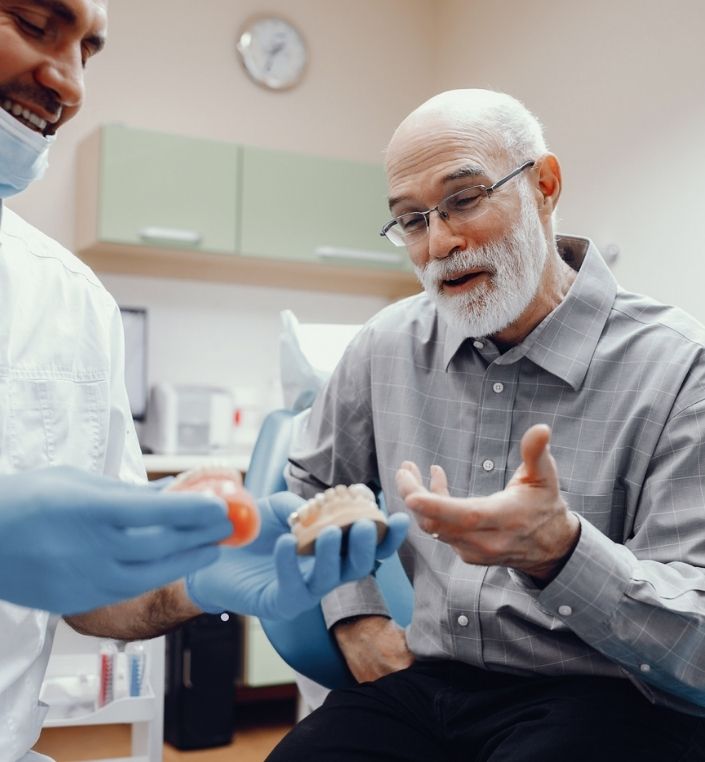
Dentures in Subiaco
Missing teeth can have a severe impact on your oral health, self-confidence and quality of life.
If you are missing one or more teeth, getting dentures is a way to restore your smile. False teeth can change your life, but it’s essential to find a dentist you trust who understands what you want from your treatment and can help you achieve those goals.
At Subi Smilemakers, we offer a wide range of dental treatments, including tooth replacement options such as full and partial dentures. We provide high-quality dentures at affordable prices using modern techniques and materials that will give you a beautiful smile again! Our experienced team will take the time to understand your individual needs before recommending which type of denture would best suit you.
The Benefits of Dentures
- Dentures are a wonderful solution for missing teeth.
- They help boost your confidence
- They enhance your smile
- Dentures help facial muscles.
- Dentures can help you speak better.
- Dentures let people eat foods they couldn't normally eat.
- Dentures today are useful and comfortable.
- Dentures are simply removed for complete cleaning.
- Most dental policies cover dentures.
Full Dentures
Full dentures replace all of your teeth, and can be either “conventional” or “immediate”.
A conventional denture is ready for use in the mouth 8 to 12 weeks after the damaged teeth are removed. Unlike conventional dentures, immediate dentures are ready to use as soon as the teeth are extracted, so you won't be seen with missing teeth during your recovery. However, bones and gums shrink over time, especially during tooth extraction recovery.
Immediate dentures require more changes than conventional dentures during the healing process and should only be used as a temporary remedy until conventional dentures can be created.
Partial Dentures
A partial removable denture or bridge is made up of substitute teeth affixed to a pink or gum-coloured plastic base, occasionally joined by a metal framework. Partial dentures are utilized when an upper or lower natural tooth remains. On either side of the gap, a fixed bridge consists of two crowns with prosthetic teeth attached. The "bridge" is then cemented. A partial denture not only fills in gaps left by lost teeth but also stabilizes adjacent teeth. Internal attachments rather than clasps secure a precise partial denture to neighbouring crowns. This one looks more natural.
Why choose Subi Smilemakers in Subiaco for dentures
Dentures are removable replacements for missing teeth. They are designed to fit your mouth and mimic the appearance of natural teeth. Subi Smilemakers in Subiaco are here to help you get back that perfect smile! We offer a wide range of products, including full and partial sets, implant-retained dentures, bridges, crowns, and more. Our goal is to provide our patients with the best care possible so they can enjoy their lives again without worrying about their dental health.
We understand how important it is to receive quality treatment from a professional team that cares about your needs as much as we do—which is why we go above and beyond every day to ensure each patient leaves happy with their new smile.
Call us today to schedule an appointment.
Frequently asked questions Dentures
Dental care for someone who wears dentures
Removable or fixed dentures, whether partial or full, need special care to keep them clean, stain-free, and in good condition. To take proper care of your dentures:
- Dentures should be rinsed after eating:Clean your dentures with running water to remove food debris. It may be helpful to place a towel on the counter or in the sink or fill the sink with water not to break the dentures if you drop them.
- Dentures should be handled with care:Clean the acrylic carefully, being careful not to bend or damage the clasps.
- After removing the dentures, thoroughly clean your mouth:If you have natural teeth, use a brush with soft bristles and use gauze or a soft toothbrush on your tongue, cheeks, and roof of your mouth (palate). Be sure to keep all the remaining denture adhesive off your gums if you use them.
- Dentures should be brushed every day:Take your dentures out and clean them with a soft brush. To remove food, plaque, and other particles, soak and brush your dentures using a soft-bristled brush or soft denture brush and nonabrasive denture cleanser. Remove any remaining adhesive from the grooves where the denture adhesive fits against your gums if you use denture glue. However, you cannot use denture cleansers inside your mouth.
- Allow dentures to soak overnight:Your dentures will retain their shape if they remain moist. Put the dentures in water or a mild denture-cleaning solution overnight. Follow the cleaning and soaking instructions provided by the manufacturer.
- Rinse after soaking: Dentures should be thoroughly rinsed before being replaced in your mouth, particularly if you have been soaking them in a denture-soaking solution.
- Get regular dental check-ups:Your teeth should be cleaned and checked by your dentist every six months. The dentist can assist you in getting the right fit to avoid slippage and discomfort, as well as inspect the inside of your mouth for signs of illness.
It is generally best to avoid:
- Abrasive cleansers: Cleaning dentures with a stiff-bristled brush, a strong cleanser, or abrasive toothpaste can cause them to become damaged.
- Hot water.Don’t use hot or boiling water on your dentures as they might warp.
- Whitening toothpaste:Many kinds of toothpaste promoted as whitening pastes include peroxide, which has little effect on denture teeth colour.
- Bleaching products: Don’t use any bleaching chemicals because they may damage dentures and alter their colour. Don’t soak dentures in chlorine-containing solutions, as this will corrode the metal attachments.
Why Do Lower Dentures Usually Have Problems With Fit/ Alignment?
Dentures aren’t the same as natural teeth, so it’s vital to understand the differences. The patient must control tongue movement and chewing movements to keep the denture in place. Changes in the stability of the dentures may require adjustments over time.
Denture problems in the lower jaw are caused by:
- Resorption of the jawbone: When teeth are removed, the jaw bone and gum ridge begin to shrink, reducing the denture’s stability.
- The warped base of the dentures:The denture base may begin to warp if it doesn’t have enough moisture.
- Jaw movement: Continually changing jawlines may makethe denture
- Saliva production and quality are decreased: The suction ability of a denture is often weakened by inadequate saliva, which can be caused by medication or medical problems.
How much do dentures cost?
Denture prices are determined by the type of false teeth and the materials used. Partchrome-plated dentures are more costly than acrylic. A full upper and lower traditional denture (item 719) in Australia may cost around $4,000. The cost of an upper or lower denture (not both) can be up to $2,200, according to the 2020 national dental fee survey.
Types of Dentures Price Range:
- Full upper and lower dentures: $3700-$4200
- Full upper denture: $2100-2400
- Full lower denture: $2100-2400
- Cobalt chrome partial denture: $1700-$2200
- Acrylic partial dentures:$1200-1700
These are approximate fees and exact fees can be given after examining the patient and making a treatment plan.
Alternatives to dentures
A dental implant is a surgical procedure that involves placing a metal post, or artificial tooth root, in the jawbone where a tooth has been lost. A natural-looking false tooth is then attached to provide a natural appearance.
Dental implants are the most dependable tooth replacement technique, looking and functioning entirely like natural teeth. It’s no surprise that dental implants are one of the most common denture alternatives.
Dental implants are more expensive up front, but they’re durable and last a long time if properly cared for, making them an excellent treatment option.
Dental Bridges
Dental bridges are a popular choice for replacing a missing tooth in the upper or lower jaw. A dental bridge has two or more crowns, with a fake tooth between them known as pontics. Natural teeth are used as an abutment to keep the structure stable. The common material used for artificial teeth could be porcelain or gold. Traditional bridges, cantilever bridges, Maryland bridges, and implant-supported bridges are some of the most popular dental bridges
Use of Denture Adhesives
In most circumstances, denture adhesives should not be necessary for using correctly fitted and maintained dentures. Over time, bone shrinkage in the mouth leads to dentures becoming loose. When this happens, it is important that dentures are replaced or that new dentures are customised to fit the mouth properly.
Use denture adhesive to:
- Assist in improving the bite and feeling of comfort by increasing their denture’s
- Relieve problems with adhesion due to lack of moisture. Dry mouth is more likely to affect older people, those on prescription drugs, and those who have medical issues.
It is not advisable to use denture adhesive if:
- You do not have good oral hygiene.
- The material causes allergic reactions or aggravation.
- You have poorly fitting or uncomfortable dentures that need to be repaired or replaced.
- A dentist hasn’t fitted you with dentures in a long time.
How to apply denture adhesives
- If you want the best results, follow the manufacturer’s instructions carefully. Don’t go overboard with the adhesive. Extra denture adhesive does not increase grip and might even result in unpleasant oozing.
- After applying the denture glue, take your time positioning your dentures properly. Press firmly with your hands or clench your teeth to seat the dentures firmly in place. Experiment until you find what works best for you.
Keep your dentures clean as it will help them attach more effectively. Also, having clean dentures will eliminate bad breath. The best way to ensure that your dentures never cause discomfort or damage is to brush them properly each night to remove all denture glue.
Most denture adhesives are designed to keep your teeth in place all day, but it’s acceptable to reapply the adhesive if necessary.
When to take off your dentures
Removing dentures at night gives your gums and other supporting tissues time to rest. At this time, the gums are exposed to the natural antibacterial properties of saliva. Also, the buildup of bacteria can be stopped by removing your dentures before going to bed.
When removed, it is best to soak them in water or a cleaning solution.Rinse and brush them before you place them in your mouth in the morning.
When Can I Get Dentures After Tooth Extraction?
After the tooth loss, it may take up to six months for dentures to be fitted, but it could take up to 3 or more months to fit well. It’s essential to give your gums time to heal and ensure a good fit for dentures.
While waiting for the traditional denture, the dentist will give you a temporary immediate denture as your gum tissue heals so that you are not left with a toothless smile while you wait for your gums to heal.
The Frequency of Dental Visits When You Have Dentures
Whether one has complete or partial dentures, it’s usually suggested that you come in for a check-up and professional cleaning every six months to keep your dentures checked and keep your oral health status in good condition.
Longevity of dentures
Conventional dentures are designed to last anywhere from 5 to 7 years, depending on how well they are taken care of. They will eventually need to be relined or remade so that they’re as safe, comfortable, and natural-looking as possible.

Ready To Schedule
An Appointment With Us?
We can't wait to help you feel confident about your smile.
Please contact us today!
